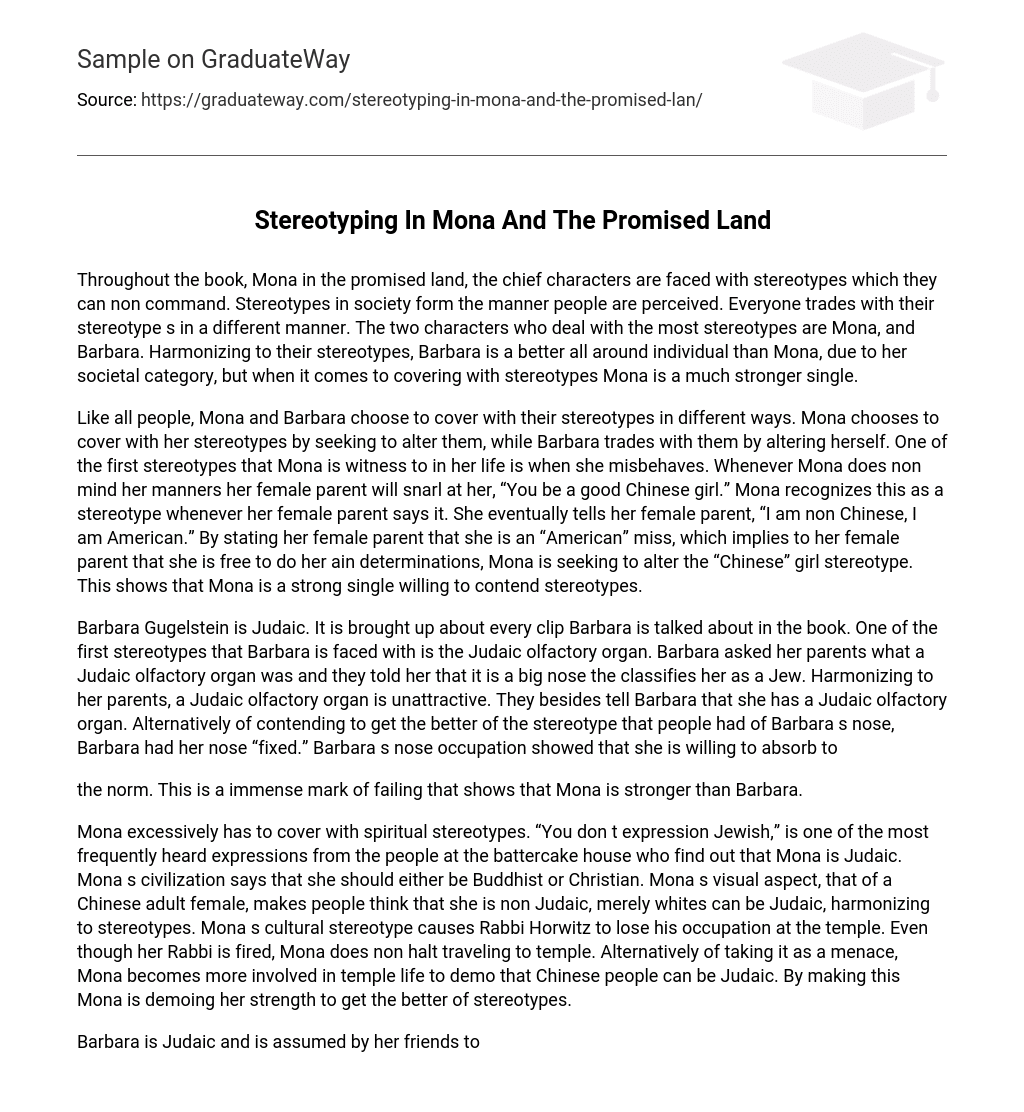Throughout the book, Mona in the promised land, the chief characters are faced with stereotypes which they can non command. Stereotypes in society form the manner people are perceived. Everyone trades with their stereotype s in a different manner. The two characters who deal with the most stereotypes are Mona, and Barbara. Harmonizing to their stereotypes, Barbara is a better all around individual than Mona, due to her societal category, but when it comes to covering with stereotypes Mona is a much stronger single.
Like all people, Mona and Barbara choose to cover with their stereotypes in different ways. Mona chooses to cover with her stereotypes by seeking to alter them, while Barbara trades with them by altering herself. One of the first stereotypes that Mona is witness to in her life is when she misbehaves. Whenever Mona does non mind her manners her female parent will snarl at her, “You be a good Chinese girl.” Mona recognizes this as a stereotype whenever her female parent says it. She eventually tells her female parent, “I am non Chinese, I am American.” By stating her female parent that she is an “American” miss, which implies to her female parent that she is free to do her ain determinations, Mona is seeking to alter the “Chinese” girl stereotype. This shows that Mona is a strong single willing to contend stereotypes.
Barbara Gugelstein is Judaic. It is brought up about every clip Barbara is talked about in the book. One of the first stereotypes that Barbara is faced with is the Judaic olfactory organ. Barbara asked her parents what a Judaic olfactory organ was and they told her that it is a big nose the classifies her as a Jew. Harmonizing to her parents, a Judaic olfactory organ is unattractive. They besides tell Barbara that she has a Judaic olfactory organ. Alternatively of contending to get the better of the stereotype that people had of Barbara s nose, Barbara had her nose “fixed.” Barbara s nose occupation showed that she is willing to absorb to
the norm. This is a immense mark of failing that shows that Mona is stronger than Barbara.
Mona excessively has to cover with spiritual stereotypes. “You don t expression Jewish,” is one of the most frequently heard expressions from the people at the battercake house who find out that Mona is Judaic. Mona s civilization says that she should either be Buddhist or Christian. Mona s visual aspect, that of a Chinese adult female, makes people think that she is non Judaic, merely whites can be Judaic, harmonizing to stereotypes. Mona s cultural stereotype causes Rabbi Horwitz to lose his occupation at the temple. Even though her Rabbi is fired, Mona does non halt traveling to temple. Alternatively of taking it as a menace, Mona becomes more involved in temple life to demo that Chinese people can be Judaic. By making this Mona is demoing her strength to get the better of stereotypes.
Barbara is Judaic and is assumed by her friends to be rich; a really old stereotype of Jews. This is shown when Seth meets Barbara at the community center and assumes she is rich. His premise is shown subsequently in the book when he state, “I didn’t think you were this rich!” Barbara s household excessively is under the force per unit area to demo their wealth. To make this Barbara and her household move to a immense house. Barbara could hold told her parents that she was uncomfortable with the move when asked, but alternatively went along with it because of her desire to conform.
Friends are sometimes thought to believe likewise, but when Mona and Barbara s ways of covering with stereotype s are compared, it turns out that their position of what they should make is wholly different. Mona is a really strong individual who will contend for self justness, while Barbara will conform to the norm so that she won t be “weird.” Mona and Barbara are both fantastic people, but when compared to each other the stereotypes are incorrect. Mona, “the good Chinese miss,” turns out to be the stronger individual who can cover with her individuality.





